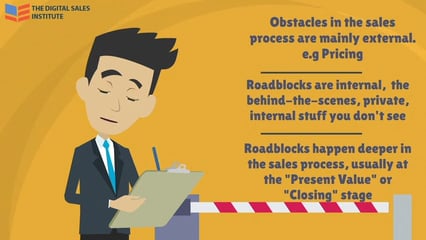Sales Discovery Questions - The Digital Sales Institute
Sales Discovery Questions - The Digital Sales Institute:
Sales discovery questions are used to move a sales conversation
with our customer or prospect into the “why care” stage. To make the
customer care about what we are saying, we need to uncover information, a
pain point, or a problem we can solve. Without discovery questions, we
cannot move to the why care (our unique and personalized value
proposition for this customer), and if we cannot get the customer to
care then there is little opportunity to continue a sales conversation.

Real and impactful discovery questions should give us a deep
understanding of our customer, their challenges, and problems. No
problem means there is no sales opportunity. Discovery calls set the
path of how we approach the deal and we rely on the answers obtained as
we walk alongside the buyer on their journey.
It is important to understand that the purpose of discovery questions
is to determine whether you and your buyer have reason to invest
further time in each other. To ascertain any appetite for change plus
what are their priorities, and goals so you can effectively engage with
them.
As the discovery stage evolves, we will use insights and questions to
help the buyer form a picture as to why they should change and the
impact of inaction on any identified problem. The discovery stage allows
for each side to learn and then determine whether any opportunity
exists to explore further.
This sharing of relevant insights should lead to a deeper
conversation around the buyer’s issues. Our role is to be a conduit of
information to demonstrate our focus on the customer, then to see if our
questions have unlocked the status quo and has the buyer become
concerned about any highlighted pain points.
Buying is an emotional business. Every customer or buyer has a
mission to improve their lives and a motivation for personal success.
Getting to the root of these may be the most important aspect in any
sale. In fact, we can only space to ask a few questions in our discovery
process, make them around this.
During the discovery process, we also need to know who the person is,
or the buying group are, who will undertake a change management process
(a buying decision is a change management issue!!) to make these
purchasing decisions. And we ideally would want to know the level of
urgency with which they want to solve this problem.
Understand our customers “PROBLEMS”
Understand how we can solve their PROBLEMS”
Understand how we can “BENEFIT their NEEDS”
C = Clarify
E = Extend
Example:
Identify: How do you currently nurture and attract passive talent?
Clarify: Is the ability to extend your employer brand to attract candidates for future roles important?
Extend: Have you considered how activating your employer brand across
selective channels could boost your application rate and speed up your
hiring?
“The answers you get depend on the questions you ask”

Situational questions. These can seem irrelevant (and uses up your
question time) if not thought out correctly. An example of a situation
question is “how many people work here?
Problem questions. These are more powerful than situational
questions, they are related to the problems our product or solution
solves. “what has prevented your achieving that objective?”
Implication questions. These questions establish and build the pain
experienced by the buyer. They are the hardest to ask and should be
carefully planned “What would you do if your agents couldn’t make any
calls for 3 days?”
Need-Pay off questions. These questions are to get the buyer to
confirm the benefits your product or solution could offer. “How much
business would you lose if your agents were unable to make calls for 3
days?”
We need to think of ourselves as investigators and connectors of
information. Asking questions, turning implied needs to explicit needs,
explicit needs are wants and desires the buyer has to take action to
resolve the pain. These needs must outweigh the costs, to shift from
problems to solutions.
How do you proactively plan to ………………?
How much business would your company…….?
What are the biggest factors that impact [related to your solution]? How do you currently address this?
Can I ask- in an ideal world what would you expect [ your solution] to deliver for you?
Looking at your current [process], if you were to rank changing
[current solution] on your list of priorities would be low, medium, or
high?
What role do you think [our solution] can play in overcoming some of the [relevant] challenges your companies face?
Can I ask you, what part of your [process] is not working as well as you wish?
Tell me about what causes you the biggest headache when [relate to
our solution]? Tell me how have you tried to solve (the challenges) so
far?
Tell me, how difficult is it to [ insert challenge or pain] for your company?
How do you feel that …….?
solution-focused to seeking value-laden experiences from start to
finish. From identifying a problem, learning about solution options, to
choosing a solution and supplier, making the decision, and then
realizing the value of the purchase. They want sales conversations and sales discovery questions
that are personalized to their needs. To have companies treat them as a
partner rather than a buyer. To have salespeople with the sales skills to help them clarify unconsidered problems and then demonstrating their expertise in understanding their business.
with our customer or prospect into the “why care” stage. To make the
customer care about what we are saying, we need to uncover information, a
pain point, or a problem we can solve. Without discovery questions, we
cannot move to the why care (our unique and personalized value
proposition for this customer), and if we cannot get the customer to
care then there is little opportunity to continue a sales conversation.

Real and impactful discovery questions should give us a deep
understanding of our customer, their challenges, and problems. No
problem means there is no sales opportunity. Discovery calls set the
path of how we approach the deal and we rely on the answers obtained as
we walk alongside the buyer on their journey.
It is important to understand that the purpose of discovery questions
is to determine whether you and your buyer have reason to invest
further time in each other. To ascertain any appetite for change plus
what are their priorities, and goals so you can effectively engage with
them.
As the discovery stage evolves, we will use insights and questions to
help the buyer form a picture as to why they should change and the
impact of inaction on any identified problem. The discovery stage allows
for each side to learn and then determine whether any opportunity
exists to explore further.
This sharing of relevant insights should lead to a deeper
conversation around the buyer’s issues. Our role is to be a conduit of
information to demonstrate our focus on the customer, then to see if our
questions have unlocked the status quo and has the buyer become
concerned about any highlighted pain points.
Buying is an emotional business. Every customer or buyer has a
mission to improve their lives and a motivation for personal success.
Getting to the root of these may be the most important aspect in any
sale. In fact, we can only space to ask a few questions in our discovery
process, make them around this.
During the discovery process, we also need to know who the person is,
or the buying group are, who will undertake a change management process
(a buying decision is a change management issue!!) to make these
purchasing decisions. And we ideally would want to know the level of
urgency with which they want to solve this problem.
Discovery questions should
Get to know our customer’s “NEEDS”Understand our customers “PROBLEMS”
Understand how we can solve their PROBLEMS”
Understand how we can “BENEFIT their NEEDS”
The ICE Sales Discovery Technique
I = IdentifyC = Clarify
E = Extend
Example:
Identify: How do you currently nurture and attract passive talent?
Clarify: Is the ability to extend your employer brand to attract candidates for future roles important?
Extend: Have you considered how activating your employer brand across
selective channels could boost your application rate and speed up your
hiring?
“The answers you get depend on the questions you ask”

Types of Discovery Questions
Factual questions. Fact based discovery questions; an example would be “how many calls do your agents make per day?Situational questions. These can seem irrelevant (and uses up your
question time) if not thought out correctly. An example of a situation
question is “how many people work here?
Problem questions. These are more powerful than situational
questions, they are related to the problems our product or solution
solves. “what has prevented your achieving that objective?”
Implication questions. These questions establish and build the pain
experienced by the buyer. They are the hardest to ask and should be
carefully planned “What would you do if your agents couldn’t make any
calls for 3 days?”
Need-Pay off questions. These questions are to get the buyer to
confirm the benefits your product or solution could offer. “How much
business would you lose if your agents were unable to make calls for 3
days?”
We need to think of ourselves as investigators and connectors of
information. Asking questions, turning implied needs to explicit needs,
explicit needs are wants and desires the buyer has to take action to
resolve the pain. These needs must outweigh the costs, to shift from
problems to solutions.
Sample Sales Discovery Questions
What role does ……?How do you proactively plan to ………………?
How much business would your company…….?
What are the biggest factors that impact [related to your solution]? How do you currently address this?
Can I ask- in an ideal world what would you expect [ your solution] to deliver for you?
Looking at your current [process], if you were to rank changing
[current solution] on your list of priorities would be low, medium, or
high?
What role do you think [our solution] can play in overcoming some of the [relevant] challenges your companies face?
Can I ask you, what part of your [process] is not working as well as you wish?
Tell me about what causes you the biggest headache when [relate to
our solution]? Tell me how have you tried to solve (the challenges) so
far?
Tell me, how difficult is it to [ insert challenge or pain] for your company?
How do you feel that …….?
Discovery Questions in the Sales Process
The modern buyer is shifting rapidly away from being product andsolution-focused to seeking value-laden experiences from start to
finish. From identifying a problem, learning about solution options, to
choosing a solution and supplier, making the decision, and then
realizing the value of the purchase. They want sales conversations and sales discovery questions
that are personalized to their needs. To have companies treat them as a
partner rather than a buyer. To have salespeople with the sales skills to help them clarify unconsidered problems and then demonstrating their expertise in understanding their business.
Comments
Post a Comment